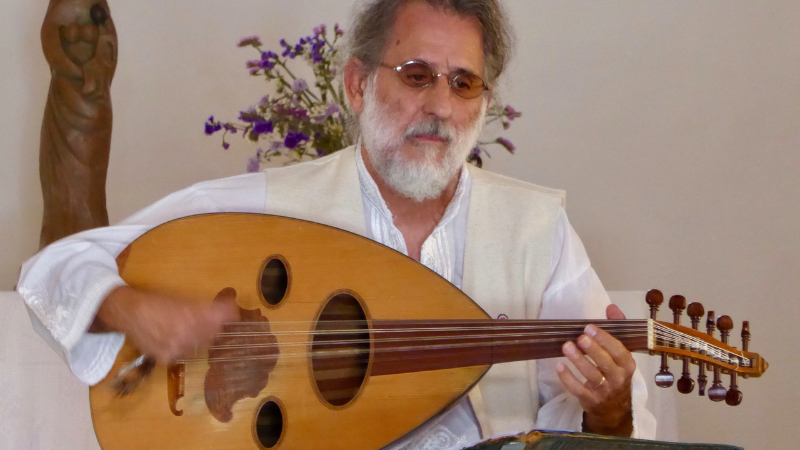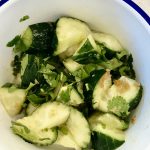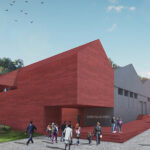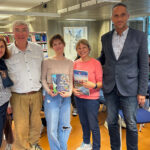Wearing a white embroidered tunic underneath a cream waistcoat, sporting a grey beard and with his hair tied back in a ponytail, Eduardo Ramos masterfully plucks haunting tunes from his alaúde, a 12 string classic Arab musical instrument. His voice is deep and sonorous and he sings with feeling.
I have heard him perform at different venues over the years and each time I have been mesmerised. This time the stage is the Hermitage of Our Lady of Guadalupe (near Vila do Bispo), one of the few medieval buildings to have survived intact in the region. It is a most fitting venue as Eduardo is an eminent proponent of Iberian medieval music, specialising in 13th century Arab and Sephardic Jewish music. At the end of the concert, the packed church echoes to the sound of applause and calls for encore.
I have always wanted to know more about the man who can produce these beguiling tunes with such flair and why he has opted for this particular kind of music. We agree to meet in Silves where he lives – again rather apt I think, as this is the ancient Arab capital of the Algarve. We spend a pleasant afternoon in a backstreet café in town. Eduardo with his infectious enthusiasm and glint in his eye outlines his own journey in life and why he believes the music he plays is of cultural and historical significance.
He tells me he was born in Penedo Gordo, a little village 5 km from Beja in the Alentejo: “Looking back on it, it was rather an idyllic childhood. We had no electricity and relied on candlelight. We didn’t have TV of course, and I played with my friends outside. We were content in our little world.” Music became part of his life early on. He was always singing songs and remembers his first musical instrument – a harmonica- that his parents bought him at a fair in Beja when he was six years old. Later he took up the viola and accordion.
His father’s professional army career opened up a whole new vista for the little boy. Eduardo’s father was posted in India for three years while his family stayed on in Portugal. He still recalls the impact of the letters and photos he received at regular intervals. It aroused a curiosity for different cultures and music that stayed with him for the rest of his life. “It was an eye opener for me to see how the world was from the perspective of a young child in a little village.”
When Eduardo was 18-years-old, the family moved to Angola in 1969 due to his father’s military posting. By this time music had taken centre stage in his life. Soon he established a musical group called ‘Os Windies’ who performed regularly in different venues. Playing rock and afro-jazz, African instruments such as the berimbau and the Angolan quissange also featured in his repertoire.
Surely the colonial war raging at the time must have affected his life? Although the family was largely sheltered in the capital Luanda, Eduardo, like all young Portuguese men, had to enlist in the army. However, he refused to carry arms. “I was lucky not to be arrested,” he laughs, “I was able to play music instead! My captain liked singing and I accompanied him on the viola. I also did concerts for other troupes.”
After the revolution of the April 25th 1974, civil war in Angola made it difficult for the Portuguese to stay on and Eduardo reluctantly returned to his homeland. As life in post revolutionary Portugal wasn’t easy, how did he manage to earn his living? “Through music of course!” is the response. Having settled in Carvoeiro, he spent the next 13 years performing in hotels and restaurants along the Algarve. His music was sought after as he offered something different but playing in noisy venues in busy tourist areas was not always satisfying. “My wife and I wanted a more authentic place for our children to grow up in so we bought a plot of land near Silves. Here we built a house where we have lived for the last 27 years,” he explains. This is also where his great passion was born – Arabic music and heritage.


He attended talks about Arab culture organised by the Cultural Association of Silves and found it of immense interest. He began to realise the extent to which it has shaped life on the Iberian Peninsula. When he heard the alaúde being played for the first time by a renowned musician, he was smitten. “I knew immediately that this was the instrument for me,” he enthuses. As he already played the viola professionally, he adapted well to this instrument but it required a lot of practice based on listening to recorded music. “I must have bought well over 300 CDs. It was the only way to learn as I didn’t read music,” he chuckles.
Although I have heard him play the alaúde (or oud) on many occasions I want to know what’s so special about this instrument. Its origins aren’t absolutely clear. Various types of alaúdes are known to have existed in early civilisations. The present short- necked pear shaped form appeared in the early part of the 8th century in Persia, Armenia, Byzantium and in the Arab world. It has a low-pitched sound with vibration and echo, suitable for the fashionable salons of the nobility. I was interested to discover that it is related to the medieval lute on which the 12 string Portuguese guitar is also based.
When I ask Eduardo what he likes about this music, he doesn’t hesitate: “the sentiments that are expressed.” Many of the songs he sings are based on the work of Arab poets, particularly Al Mutamid, 11th century caliph of Seville, considered to be one of the greatest of the Andalusian poets. As a Poet-King he could write freely about himself and the world in which he lived, expressing thoughts in an open-minded, timeless way that still resonates today.
“The culture and tradition of the people is something that needs to be preserved today,” he says. “We need to remember that we have a past and that it is closely linked with Arab history. This is important, particularly for the younger generation to appreciate.”
The impact of 500 years of Islamic rule can’t be underestimated (from the early 8th century to the Christian Reconquista of 1249). At the time the Algarve was known as Al-Gharb (the west), as it was the westernmost possession of the Arab empire.
In recent years there has been a re-evaluation of the Arab legacy in Portugal and an increasing appreciation that it is something positive. Eduardo points out the rich heritage that was brought to the peninsula: arts and music; medicine; improved navigational tools and advanced technologies, including new agricultural methods and irrigation. I am reminded that the remnants of noras, the old waterwheels that revolutionised agriculture, still visible in the countryside, were brought by the Arabs. In addition, the Portuguese language adopted thousands of Arab words, still in use today.
“There was a great mix of people with Muslims and Christians intermarrying and a large Jewish community that was well integrated. After the Reconquista of 1247, many of the Arabs stayed on,” he says.
I am curious to know something about the Sephardic Jews and their musical traditions. Eduardo explains that when the Arabs arrived they found a large Jewish community in the Iberian Peninsula who had settled there at the start of the second millennium. Life under Muslim rule was a great opportunity for them and they flourished culturally. “And yes, there are many similarities between Sephardic and Arabic music as they share the same musical heritage in medieval Spain and Portugal,” he adds.

Eduardo sings in Judaeo Spanish (or Eastern Ladino), the language used by Sephardic Jews, in Arabic as well as in medieval Galician Portuguese. Another way of preserving old traditions and heritage.
The last 25 years of his life have been dedicated to promoting this music both in Portugal and abroad. He performs at fairs, medieval festivals, libraries, museums and thematic events. When asked what his commitments are at present, he lists a series of events. He took part in sessions at a variety of schools in Lagoa, performed Sephardic songs in another town, followed by a performance of Arabic and Christian music at a medieval festival in Monsanto. He also participated in the inauguration of the Museum Domião de Góis, in Alenquer, north of Lisbon, dedicated to the victims of the Inquisition. And he is busily preparing for the International Festival of Sephardic music in Cordoba next month.
There is no doubt that he has had a long and distinguished career as a musician. What’s his biggest achievement? I expect him to mention being the only Portuguese representative at the International Festival of Sacred Music in Fez two years ago or perhaps performing in front of Prince Aga Khan. Instead he says: “It’s arriving at a place and winning the public over with the music and passion I offer. This is always a major achievement for me.”
He considers himself to be fortunate to have a supportive family. His wife, “the love of my life”, is also fond of music. She is his right arm and helps him with his professional work. His daughter is an accomplished dancer while his son is a professional musician. He tells me that at times all three perform together. A perfect team by the sound of it.
When I ask him if he has any intention of retiring any time soon, he laughs. “No, musicians never retire. If I stop doing music, there’s no point in living. Music gives energy, strength and the will to carry on.”
I hope that for the sake of the captivating music he plays and his desire to preserve a heritage that has moulded present-day Portugal, he will carry on for a very long time to come.
For more information:
eduardoanramos@gmail.com













